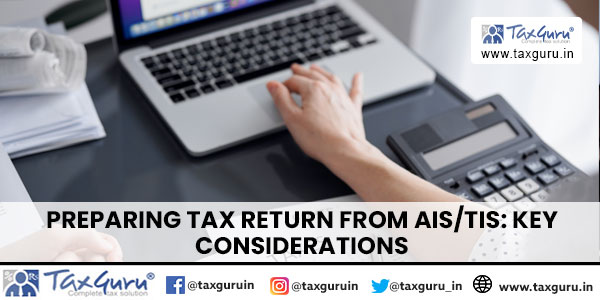When preparing a tax return based on the Annual Information Statement (AIS) and Tax Information Summary (TIS), you may encounter certain transactions that are not reflected in these statements. It is crucial to be diligent in including all relevant income and transactions in your tax return to ensure compliance and avoid penalties. This article outlines the key considerations for various types of income and transactions, particularly those that might not appear in AIS/TIS.
Key Income and Transactions to Report
1. Rent Received from Private Parties
Income from renting out property to private parties must be included in your tax return, even if not shown in the AIS/TIS. Maintain accurate records of all rental agreements and payments received. Report this under the “Income from House Property” section.
2. Trading of Intraday
Intraday trading income, which is speculative in nature, should be reported under “Income from Business or Profession.” Keep detailed records of all transactions, including buy and sell prices, to accurately calculate your profits and losses.
3. Trading of Futures and Options (F&O)
Income from trading in futures and options (F&O) is also categorized under “Income from Business or Profession.” Ensure you have detailed transaction records and calculate your net income after considering both gains and losses.
4. PPF Interest
Interest earned from a Public Provident Fund (PPF) account is tax-exempt. However, it is advisable to report it in the “Exempt Income” section for transparency and to avoid potential scrutiny.
5. Annuity and Pension from Life Insurance
Annuities and pensions received from life insurance policies should be reported under “Income from Other Sources.” Ensure you include all payments received during the financial year.
6. Immovable Property Transactions Below Rs 30 Lacs
Even if the transaction value of immovable property is below Rs 30 lacs and may not be reported in AIS/TIS, it must be included in your tax return. Keep records of the sale/purchase agreements and report it under “Capital Gains” or “Income from Other Sources,” as applicable.

7. Income from Agriculture
Agricultural income is exempt from tax but must be reported if it exceeds a certain threshold. Maintain records of agricultural produce sales and related expenses to substantiate your income claim.
8. Receipt from Foreign Sources
Any income received from foreign sources must be reported under “Income from Other Sources” or “Income from Business or Profession,” depending on the nature of the income. Ensure compliance with the Foreign Exchange Management Act (FEMA) regulations.
9. Rent from Plant and Machinery from Private Parties
Income from renting out plant and machinery to private parties should be reported under “Income from Other Sources.” Keep records of rental agreements and payments received.
10. Interest from Bonds
Interest earned from bonds, including tax-free bonds, should be reported. Tax-free bond interest should be shown under “Exempt Income,” while taxable bond interest should be included in “Income from Other Sources.”
11. Vehicle Purchase Below Rs 10 Lacs
While the purchase of a vehicle below Rs 10 lacs is not directly taxable, ensure that you maintain records of the purchase and payment source, as significant expenditures may attract scrutiny.
12. Exempted Interest – NRI Accounts
Interest earned from Non-Resident Indian (NRI) accounts, which is exempt from tax, should still be reported under “Exempt Income.” This ensures clarity and avoids potential discrepancies.
Key Points to Remember Before Filing Your Return
- Verify AIS/TIS Data: Cross-check the information in your AIS/TIS with your records. Include any income or transactions missing from these statements.
- Maintain Records: Keep detailed records of all financial transactions, including invoices, receipts, bank statements, and investment proofs.
- Report All Income: Ensure that all sources of income are reported, even if they are tax-exempt or below reporting thresholds in AIS/TIS.
- Review Deductions and Exemptions: Carefully review and claim all eligible deductions and exemptions to reduce your taxable income.
- Consult a Professional: If in doubt, consult a tax professional to ensure accurate and compliant tax return filing.
Conclusion
Preparing your tax return requires meticulous attention to detail, especially when certain transactions may not be reflected in your AIS/TIS. By ensuring that all sources of income are accurately reported and maintaining comprehensive records, you can avoid potential issues with the tax authorities and optimize your tax obligations. Taking these steps will help you achieve a smooth and compliant tax return filing process.
*****
Author: CA (Dr) Piyush Kapoor | Email: capiyushkapoor@yahoo.com
Disclaimer: These are author’s personal views and cannot be construed to be the views of the ICAI. It shall not be used for any legal advice/opinion and shall not be used to render any professional opinion/advice. The information contained in the article is for the purpose of spreading information / knowledge/ awareness and shall not be treated as solicitation in any manner or for any other purpose.





